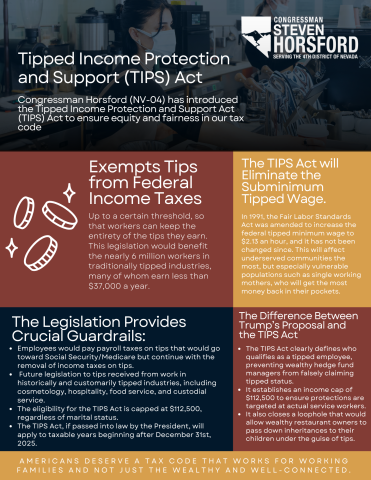Tipped Income Protection and Support (TIPS) Act

Congressman Horsford (NV-04) has introduced the Tipped Income Protection and Support Act (TIPS) Act to ensure equity and fairness in our tax code
Exempts Tips from Federal Income Taxes
Up to a certain threshold, so that workers can keep the entirety of the tips they earn. This legislation would benefit the nearly 6 million workers in traditionally tipped industries, many of whom earn less than $37,000 a year.
The TIPS Act will Eliminate the Subminimum Tipped Wage.
In 1991, the Fair Labor Standards Act was amended to increase the federal tipped minimum wage to $2.13 an hour, and it has not been changed since. This will affect underserved communities the most, but especially vulnerable populations such as single working mothers, who will get the most money back in their pockets.
The Legislation Provides Crucial Guardrails:
- Employees would pay payroll taxes on tips that would go toward Social Security/Medicare but continue with the removal of income taxes on tips.
- Future legislation to tips received from work in historically and customarily tipped industries, including cosmetology, hospitality, food service, and custodial service.
- The eligibility for the TIPS Act is capped at $112,500, regardless of marital status.
- The TIPS Act, if passed into law by the President, will apply to taxable years beginning after December 31st, 2025.
The Difference Between Trump’s Proposal and the TIPS Act
- The TIPS Act clearly defines who qualifies as a tipped employee, preventing wealthy hedge fund managers from falsely claiming tipped status.
- It establishes an income cap of $112,500 to ensure protections are targeted at actual service workers.
- It also closes a loophole that would allow wealthy restaurant owners to pass down inheritances to their children under the guise of tips.
